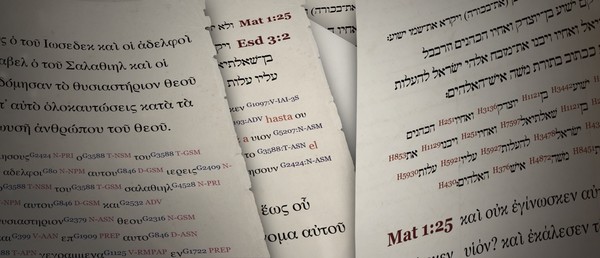Are you a seminary student about to take your first classes in Greek and/or Hebrew? For many, learning the Bible’s original languages can seem incredibly daunting. You may have talked to a pastor or other seminary graduate who has shared horror stories about their language classes. They may also have told you that they now remember little of what they worked so hard to learn. They may even have told you that they never really needed the languages in their actual day-to-day ministry, and that they wish their seminary had offered more practical courses and had fewer language requirements. No matter what anyone else has told you, I’m here to dispel any fears you may have about tackling Greek or Hebrew!
Are Greek and Hebrew difficult languages to learn?
I guess it all depends on whom you ask. The average two-year-old growing up in Greece or Israel today would probably tell you they have no problem learning those languages.
Seriously, if a language can be learned by little children, then we should never think of it as “difficult.” The thing that makes it hard at first is its unfamiliarity. It’s new. It’s different than anything you’ve ever learned before. But isn’t that what makes it exciting?
Will learning Greek and Hebrew really help me in the work of ministry?
Isn’t it possible to preach a good sermon, teach a good lesson, lead worship, be an effective counselor, or minister in a thousand other ways without knowing the biblical languages? Sure it is. But what do you do when careful exegesis of the Scriptures is absolutely vital to your ministry? For example, what if the people to whom you are ministering have come under the influence of some strange new teaching that twists the text of the Bible in some way? What if your congregation is trying to arrive at a clear position on the latest theological controversy? What if you have to counsel someone who has been told that the Bible doesn’t really condemn his or her sin? In some cases, you can settle these issues with a careful look at the context of a passage and maybe the use of some basic Greek and Hebrew tools. However, I can’t count the number of times that knowing Greek and Hebrew made me much better equipped to handle these kinds of situations. At such times, I had no doubt of the practical value of original language study.
Will I forget it all after seminary?
Not if you make an effort to keep using what you’ve learned. I took Classical Greek in college and then Biblical Greek in seminary. One of my college profs apparently would translate classical Greek literature as a form of evening relaxation. One of my seminary profs told me that he was not a star Greek pupil, but after seminary he committed to translating a few verses of the Greek New Testament each day. Over time, be became proficient enough to teach it. I know what you’re thinking: “What nerds!” Okay, maybe that’s what I’m thinking because I’m personally jealous of their discipline! I’m afraid I was never anywhere near that disciplined.
For me, “keeping” my Greek (and Hebrew) simply meant using it when the occasion arose. Having ready access to all the tools available in Accordance made dusting off my Greek and Hebrew much easier, since I didn’t have to give up in frustration every time I ran into an unfamiliar word or grammatical construction. My point here is that I’ve been fairly haphazard in my attempts to “keep up” my knowledge of the languages. But you know what? A few months back I decided to spend a little time each day translating a few verses of the Greek New Testament and a few verses of the Hebrew Bible. When I did that, I was very pleasantly surprised at how much vocabulary I remembered and how easily I could recognize certain grammatical characteristics. I was able to pick up on Hebrew wordplay, and even noticed an odd construction where seemingly masculine adjectives were used of women. It was fun and encouraging to see how much Greek and Hebrew I had actually retained after twenty-plus years.
Today, there are all kinds of resources and blogs devoted to helping you “keep” your Greek and Hebrew. We even have a section of our user forums devoted to working through passages together. But even if, like me, you’re somewhat haphazard in your efforts, I’m happy to report that you’ll retain far more than you think.
So if you’re about to tackle learning Greek or Hebrew, there’s no need to be afraid. When it gets difficult, remember that if children can learn these languages, you can too. When you wonder if it’s worth it, rest assured that it will pay huge dividends for years to come. Finally, when you need help along the way, Accordance has got your back!


